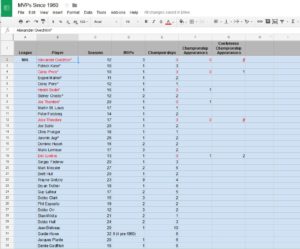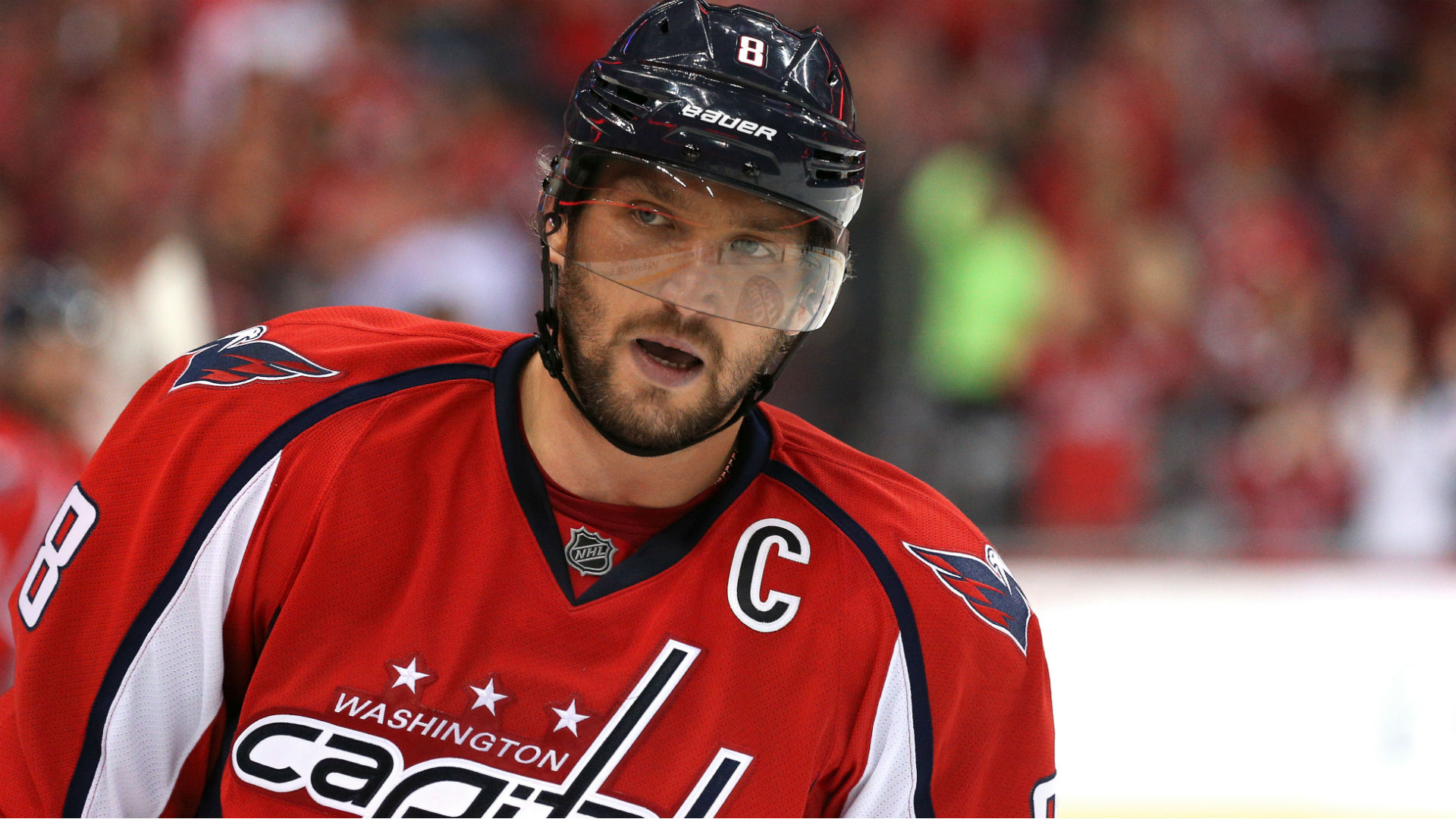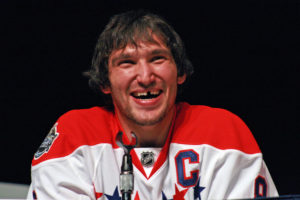It’s been awhile since I’ve delved into the sports realm here, but this was a topic I couldn’t resist. Alexander Ovechkin is the least successful best player in the modern history of the four major American sports leagues.
That isn’t conjecture, either. It’s fact.
This idea first came to mind as I simply couldn’t think of any player who was as individually successful over as lengthy of a career as Ovehckin, while achieving as little in the postseason.
Make no mistake, Ovechkin has been incredibly successful too, which makes his failures in the playoffs—and even on the Russian Olympic team, as well—all the more vexing. There’s no doubt he’s an instant Hall of Famer and one of the top scoring threats in NHL history.
He just can’t win.
Is Ovechkin The Worst Best Player Ever?
Rather than delving into +/- statistics, what line he plays on or in what situations of the game he’s trusted to be on the ice—and none of these would be favorable to Ovechkin, mind you—the simplest and best comparison is to look for players who are equal to his individual greatness while never winning a championship, and further, have never even competed for one, let alone made it to the conference finals in his respective league.
More simply, my analysis here is comparing MVPs versus championships and playoff success.
 (Yes, I created a spreadsheet. You can view the entire thing here).
(Yes, I created a spreadsheet. You can view the entire thing here).
In the interest of full disclosure: I’m a fan of the New York Rangers. I’ve been known to grow beards for the team. I have been influenced by seeing what a single great player can do in the postseason, as with Mark Messier’s famous 1994 guarantee, followed by a come from behind win thanks to his hat trick, a series win, and ultimately a Stanley Cup.
I’ve also seen how great players I root for can go an entire career without bringing home a championship. Read: Ewing, Patrick.
What follows here though casts fandom aside and is about facts and numbers, not opinions.
Ovehckin vs. Other NHL MVPs Since 1960
In 12 seasons, Alexander Ovechkin has won 3 MVPs, while winning 0 championships, and boasting 0 appearances in the finals, and 0 appearances in conference finals.
- Since 1960, only five other NHL MVPs besides Ovechkin failed to win a championship.
- Every other multiple MVP winner has at least one championship.
- Of those five single MVP non-winners, three others are still active—Carey Price, Henrik Sedin, and Joe Thornton. The latter two have appeared in a finals, but failed to win. Price has one conference finals trip.
- The fourth, Eric Lindros, had his career cut short to injury and appeared in one finals.
- The fifth, Jose Theodore, is the only other MVP to have not made it to a conference final.
Don’t worry Ovechkin fans, he holds up in history compared to Jose Theodore.
The statistics here are staggeringly against Ovechkin. MVP players in the NHL win championships, period.
- Including Ovechkin, 32 players have been named MVP since 1960 and 27 (84.375%) have won championships.
- More tellingly—100%, 11 out of 11, of multiple MVP winners besides Ovechkin have won championships.
- 10 of 11 multiple MVP winners actually won multiple championships. Only Stan Mikita, with two MVPs and one championship to his credit, did not.
Ovechkin vs. NBA MVPs Since 1960
- Since 1960, six NBA MVPs have failed to win a championship. One, Kevin Durant, is likely to fix that this year, and already has a championship finals appearance.
- Two multiple MVPs never won a championship—Steve Nash, who made it to four conference finals, and Karl Malone, who made it to three championship finals.
- Like Malone, Charles Barkley is another MVP player who didn’t win a championship while playing in the Michael Jordan era. Regardless he made it to one finals.
- Allen Iverson dragged his team to the finals, but couldn’t win a championship.
- The sixth and final entrant is Derrick Rose, now a fraction of his former self. He’s played only eight years in the league, suffering a career-altering injury in the postseason the year after winning his MVP and making a trip to the conference finals.
With the NBA, we have the two closest matches to Ovechkin’s career arc in Malone and Nash. Each was a multiple MVP winner with zero championships. Both though enjoyed lengthier playoff success, on a continual basis, than Ovechkin.
- Overall, 23 of 29 (79.3%) MVPs won championships
- 11 of 13 (84.6%) multiple MVPs won championships.
With the NHL and the NBA, we have the two sports where individual players can make a much larger impact on team success, as opposed to next two that follow, the NFL and MLB.
Ovechkin vs. NFL MVPs Since 1960
- Since 1960, 47 players have been named MVP, and 25 have won championships, representing only 53.2%.
- Narrowing down the field, only 9 of 22 non-winners failed to play in the Super Bowl or its predecessor championship game.
- The most common thread is the dominant running back recognized for individual greatness on an otherwise less than great team, including Adrian Peterson, LaDainian Tomlinson, Barry Sanders, Earl Campbell, and OJ Simpson.
What’s damning to Ovechkin here then is that even in a league such as the NFL where MVPs don’t correlate to championships, multiple MVPs still absolutely do:
- Since 1960, nine of nine (100%) multiple MVP winners in the NFL have won championships.
Ovechkin vs. MLB MVPs Since 1960
With baseball things get trickier for three reasons:
- There are two MVPs in each season, and as such the value of the award gets somewhat diluted.
- An MVP caliber player on a baseball team offers the smallest overall impact on his team’s success versus any other team sport.
- Playoff structure changed over the years, adding rounds as the decades passed.
Nevertheless, let’s get into the numbers:
- Since 1960, 92 players have been named MVP, and 51 have won championships, representing 54.3%, surprisingly a notch higher than the NFL.
- 17 players have won multiple MVPs, with 11, or 64.7%, winning championships.
- Those who did not include Barry Bonds, Juan Gonzalez, Frank Thomas, Robin Yount, and Dale Murphy.
- The sixth who hasn’t is Mike Trout, with seven years of league service.
Since 1960, Bonds is the only player besides Alexander Ovechkin in any of the four major American sports to win three or more MVPs, without ever winning a championship.
Summing Up
- All told, 25 players have won three or more MVPs since 1960. 23 of 25 (92%) won a championship and 16 of 25 (64%) won multiple championships.
- Ovechkin is the only three-time MVP in any league since 1960 to not so much as play for the championship.
It’s an exclusive, high-performing club, but that’s the point, we’re talking about the worst best player ever. You could say that only 24 other men in any sport since 1960 have been as individually great as Alexander Ovechkin has been. And they’ve all done more in the postseason than he has.
So is Ovechkin the Steve Nash of the NHL? He’d still need four conference finals berths to earn that recognition. The Karl Malone? Three trips to the finals and six overall to the conference finals is a lot of postseason success to equal, even without a title.
The Barry Bonds? Even with the out-sized impact of a peak-steroids Bonds, you’d be hard-pressed to say he could impact a game as much as a NHL MVP in his prime should be able to. Bonds though did still lead his team to one World Series and three additional league championship series.
I rest my case: Alexander Ovechkin is the worst best player in the modern history of American sports.
And listen, he can flip the script on his career with a single year of playoff greatness culminating in a ecstatic gap-toothed grin as he undoubtedly jumps into the boards while hoisting the Cup over his shoulders. That’s all it would take.
Until then, the Great 8 is very much in a league of his own, and not in the way he would ever want to be.



